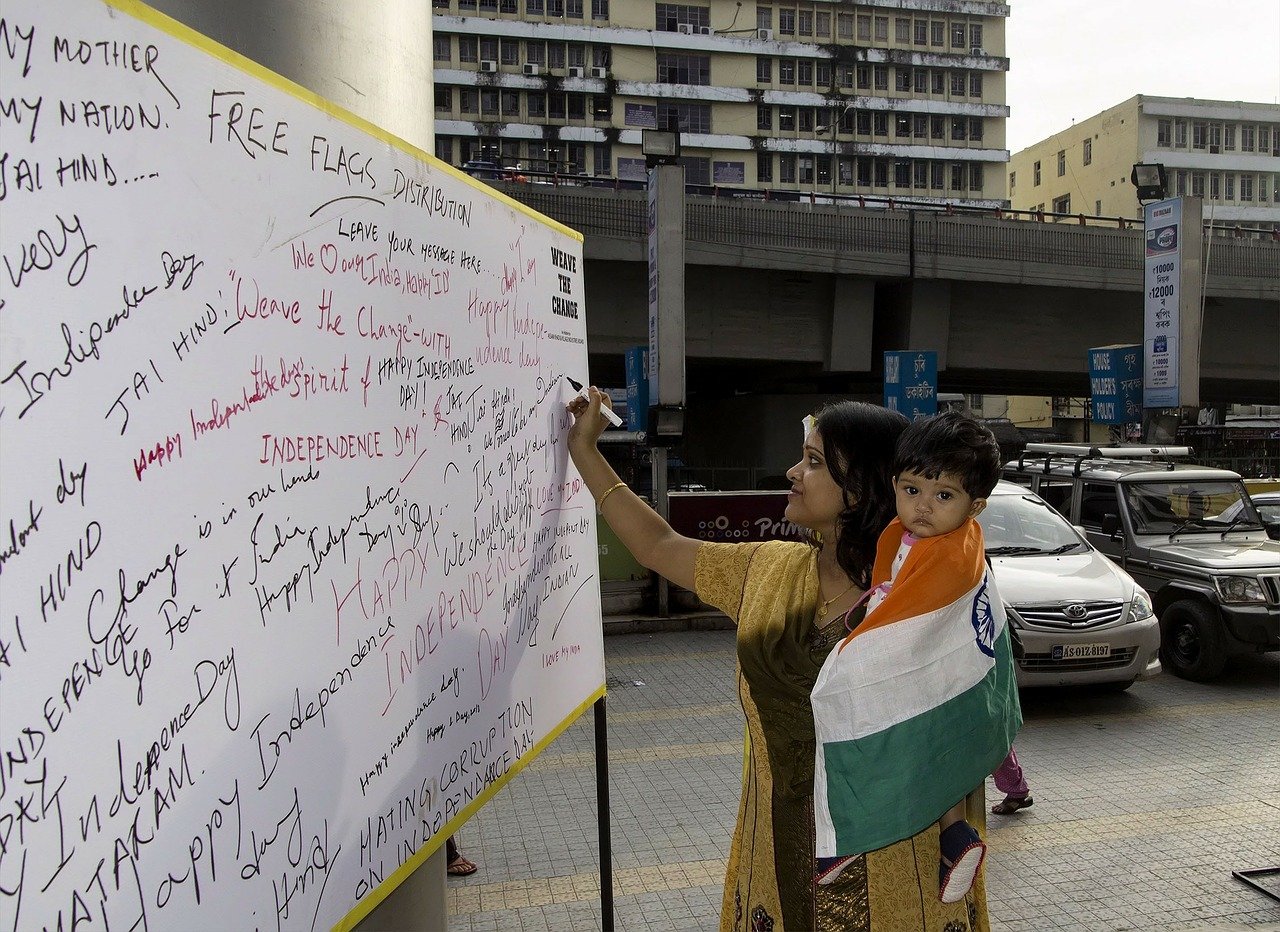Where once the white of peace waltzed with the green of prosperity, the ballroom of democracy seems to have been replaced with authoritarianism. The power of the citizen has been undermined by politics that cajoles Hindus to think of others as enemies and cudgels minorities to keep a watchful eye on Hindus.
Socrates once wrote, “A system of morality which is based on relative emotional values is a mere illusion, a thoroughly vulgar conception which has nothing sound in it and nothing true.”
“Emotional values” – or values based on one’s conscience – have now been corroded, as the idea of India is being threatened in its 75th year. Where once the white of peace waltzed with the green of prosperity, the ballroom of democracy seems to have been replaced with the barrenness of authoritative fascism that reeks of political insecurity and moral turpitude in almost every institutional machinery.
Should one read James Porter, the entire idea of emotional values will fall through, for he writes: “Don’t shut down discussion; that way lies censorship and a narrowing of vision. The biggest mistake at the moment is to talk about offending the Muslim ‘community’… It lumps people into one homogeneous group, depersonalises them and makes it easier to attack them en masse.” If one supplements the phrase “Muslim community” with Christians, Dalits and other minorities, you will be looking at the state of affairs in India.
We have so much to be anxious about – right from the pandemic to the woes of unemployment and custodial deaths. The cascade of miseries has India trapped from all quarters because it lacks a unifying leader at the helm of affairs. While the old are divided by ideological barriers, the young seem to be fumbling their way through understanding political ideology, with many not interested in politics at all.
The representative form of democracy was adopted and enacted as the basic structure in order to cement governmental responsibility. But India has metamorphosed over time from a country where India’s first prime minister encouraged a cartoonist not to “spare” him, to a country where a WhatsApp text against the government is blasphemy and against the prime minister is treason.
The moral turpitude in the political class is not one that is unseen or unheard of in the history of the world. However, it is the extent of this immorality – of brushing pandemic deaths under the carpet and shutting down the Opposition’s demands and questions – that has every thinking, rational and logical Indian asking: “Are we really celebrating the 75th year of our independence or merely commemorating a once-in-a-lifetime technicality?”
The power of the citizen has been undermined over time by politics that cajoles Hindus to think of others as enemies and cudgels minorities to keep a watchful eye on Hindus. To rephrase Donne, “O Conscience, where is your sting / O Morality, where is thy victory?”
Revival of Nehruvianism?
The ruling Bharatiya Janata Party (BJP) government’s singular obsession with the Congress Party’s Gandhi family has brought with it one excellent side-effect. Their constant hammering has ensured that the Nehruvian principles – especially the Panchsheel which included the five tenets of mutual respect for each other’s territorial integrity and sovereignty, mutual non-aggression, mutual non-interference in each other’s internal affairs, equality and cooperation for mutual benefit and peaceful co-existence, which were biting the dust under the Congress regime – have now made headway into mainstream society.
In 2018, The Hindu Business Line ran an article on why India needs to bid farewell to Nehruvian socialism: “[Nehru’s] admiration for the Soviet model of central economic planning and the then absence of a strong private sector, compelled government investment in basic industries and infrastructure.”
But now, with much of the public sector on sale and the economy still floundering, Nehruvian principles of secularism, socialism and indeed even mutual acceptance are slowly and steadily making their way back to the collective Indian mindset.
This is also thanks to the fact that, apart from the policy of rechristening and working as government cartographers to redraw states, the BJP has failed to deliver on all fronts – be it the economy, social disparity or even religious tolerance.
But that’s where one witnesses an interesting page-break. While the politically charged elements of the Indian diaspora are spewing venom against the minorities, the extent of its charm has already begun to recede. Fuelling India’s democracy the wrong way has backfired and now, people are waking up to their reality.
In an international lecture at the Simon Fraser University in Vancouver, human rights activist Santosh Dass suggested that Hindus carry their caste with them when they leave India. And while caste discrimination is rampant in the UK, at least a young Dalit woman doesn’t live there in the fear of getting raped, a young Dalit man isn’t under the threat of being beaten, and a young Dalit child isn’t constantly stigmatised by society, with the label of untouchability slapped on his head at a tender age. As Dass pointed out, the lower castes have faced more atrocities under the BJP.
Where Nehru earned the respect of the entire subcontinent, the current regime has failed to institute a robust foreign policy, thereby giving an opportunity to the Chinese to infiltrate. The Nepalis are feuding over Kalapani and the Bangladeshi government is trying to assert itself over interminable water disputes. Even next-door Bhutan seems to now raise an eyebrow at our decision-making skills.
Political Reawakening
Political maturity seems passé as we enter our 75th year of independence. Nehru vilification seems the norm and Modi devotion is the unwritten mandate. It is indeed intriguing that the same Sardar Patel who banned the Rashtriya Swayamsevak Sangh (RSS) has now been lavished with praise, as the supposedly unsung hero of the Congress.
The political misappropriation of historical characters has not just disabled India’s democracy; it also questions the merit of its existence and its acceptance, for you cannot accept the India of the present without the Nehru, Patel and Gandhi of the past. You cannot stake a claim to your Indianness without humbling yourself to the legacy of every single man and woman who laid their lives for the idea of India. You cannot commemorate India in 2021 after discrediting the Indian National Congress and the nature of her birth in 1947.
Yet another Parliamentary session has just ended and with the government’s steadfast reluctance to respond to the questions of the Opposition, one is reminded of the Greek philosopher Pericles who once wrote, “Instead of looking on discussion as a stumbling block in the way of action, we think it an indispensable preliminary to any wise action at all.”
The onus of a robust democracy lies in the awareness, interest and power of discernment of its citizenry. What is needed is a revival and reformation of the corroding collective mindset. As a young child, I was told that a teacher is as important and sometimes more important than the parents; as a teacher today, I see how young women are insulted for having an opinion, for questioning the moral side of democracy. It is this heightened sensitivity – so selective in its manifestation and in favour of the improper, incorrect and immoral – that renders its hypocritical value higher than its moral value.
“A moment comes, which comes but rarely in history, when we step out from the old to the new, when an age ends, and when the soul of a nation, long suppressed, finds utterance.” As India steps into another new year of its existence, we can only hope that Jawaharlal Nehru’s words breathe new life into India’s reality.
Katherine Abraham has completed her MA LLB, MBA and is currently pursuing her second Master's degree in Political Science. She is the author of Every Sunset Has a Story and The Rice Bag's Argument. She is an international freelance journalist (INS), public speaker, teacher and international photographer.


